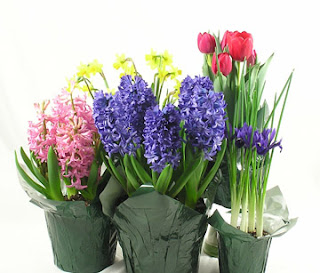Plant Care: Bulbs and Orchids
MMF Plant Care Tips: Bulbs and Orchids
We have noticed that one of the things people most often ask about is plant care. I'm going to write a series of blogs with some basic plant care instructions. These are all plants we carry in our shops and want you to feel comfortable bringing one of beauties home!
Bulb Plants are an easy and economical way
to add color to your home and garden year after year.
Sun Exposure: moderate, indirect light
Care:
·
Keep soil moist, water
thoroughly when water is dry to the touch, draining excess water.
Replanting
Bulbs:
·
Once
the plant has stopped blooming, stop watering and wait for foliage to die back.
-
· Once the foliage is dried out and brown, remove from bulb by gently tugging. If foliage does not pull off easily, you may not have waited as long as needed. It is very important to allow foliage to stay on bulb until completely dry as it outs energy back into the bulbs for the next flowering.· Remove bulbs from dirt and dust off, discard of any bulbs with rotten or soft spots. Allow to dry out on paper in cool, dry area.· Replant bulbs in Fall between September and November.
Phalaenopsis are
the most popular potted orchid due to their ease of care and long lasting
blooms. Phalaenopsis care is very similar to other types of potted orchids, and they are the ones you'll see most commonly sold.
Plant Type: Orchid, Blooming Houseplant
Sun Exposure: Low light, an east window is
ideal, or a south or west window if protected by a sheer curtain.
Planting:
·
You
may use a shallow tray of pebbles filled with water to increase humidity around
your plants. Be sure the pot does not sit in water as this will rot the roots.
Care:
·
If
your orchid is potted in bark watering once a week is generally sufficient. If
your plant is potted in moss, water when the top feels dry. The amount of light
and heat your plant receives will also affect how soon your orchid needs
watering. Summer months will need more frequent watering, winter will need
less. After a few waterings, you will be able to tell by the weight of the pot
whether or not it is time to water again. If in doubt, wait a day.
·
It
is best to water in the morning. Place the plant in the sink and use tepid
water. Do not use salt-softened or distilled water. Let the water run through
the plant for a minute or so. Be sure to let the plant drain completely.
·
If
any water remains in the crown (where the leaves join in the center) use a
paper towel to blot the water to avoid crown rot.
Cutting the Spike:
·
When
the blooms are finished, you can cut the spike down to the level of the leaves
and the plant will bloom with larger flowers and a strong stem within a year.
You can also cut off the stem leaving two nodes (those little brown lines on
the stem below where the flowers were) on the stem. One of these nodes will
then initiate and generally produce flowers within eight to 12 weeks.
Hope you found this information helpful! Have a great weekend! :)





Comments